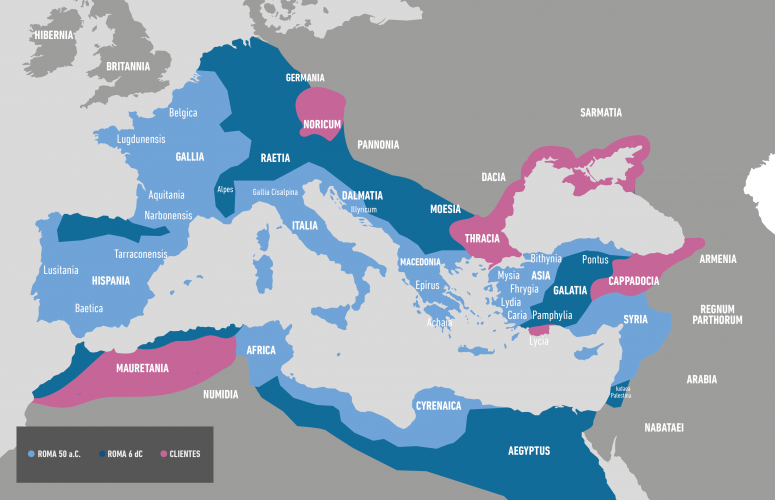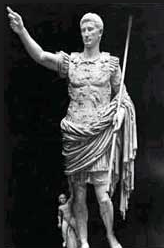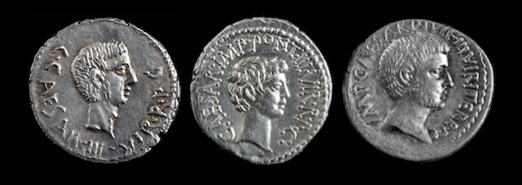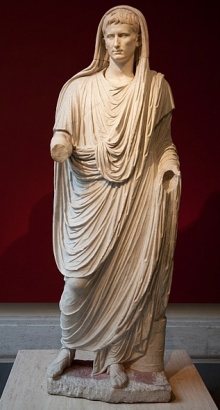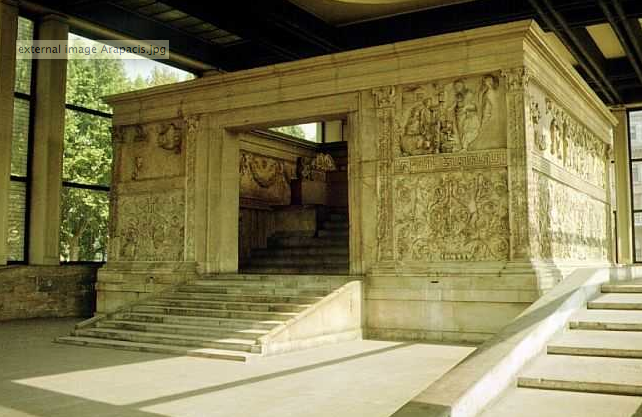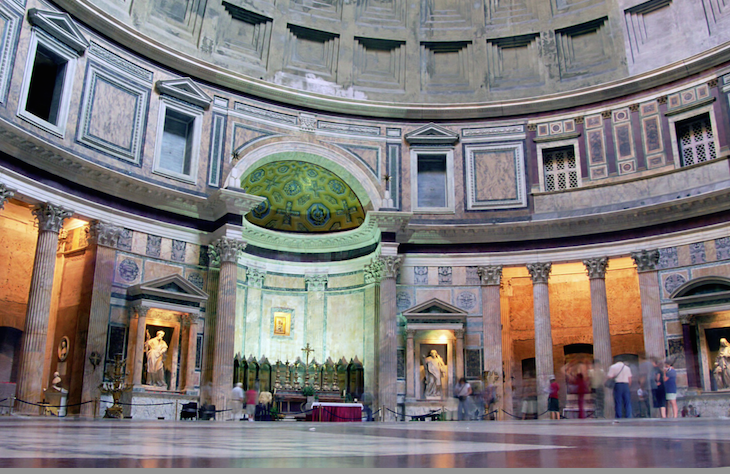The Empire
The Empire is the period of Roman history that begins in 27 BC, when the Senate granted Octavian the title of Imperator Caesar Augustus.
The beginning of the Empire is partly due to the territorial expansion of Rome around the shores of the Mediterranean.
The immense territory over which Rome extended its influence soon made new conquests would become ungovernable zones for Senate unable to take decisions quickly.
Moreover, the size of an increasingly large army revealed the importance of having authority over the troops for political gain. That's how emerged characters with great ambition whose main objective was to gain power, even at the cost of defying the authority of the Senate.
The bases of the Empire as a political system were established during the wars that followed the death of Julius Caesar. After the civil war that faced Pompey and the Senate, who defeated at Pharsalia, Caesar had erected in absolute ruler of Rome and had become Dictator perpetuus. This decision did not please the more conservative members of the Senate, who conspired against him and assassinated the Ides of March 44 BC.
Years later, the young Octavian, Caesar's adopted son, de facto became the first emperor of Rome after defeating in the battlefield, first in Philippi to the murderers of Caesar, Brutus and Cassius, and later at Actium to his former ally Mark Antony, who had joined the queen Cleopatra VII of Egypt in an ambitious alliance to conquer Rome.
Upon his triumphant return from Egypt, from that moment become a Roman province, the implementation of the imperial political system became unstoppable and although maintained the republican forms, the reality soon became a dynastic character system (Principality).
Invested with the title of Imperator Caesar Augustus, Octavian secured his power with major reforms and a political and cultural unity centered in Mediterranean countries.
Caius Iulius Caesar Augustus
Augustus was the first emperor of Rome. Born in 63 BC under the name of Gaius Octavius Turinus, was adopted at will by his great-uncle Julius Caesar (adoptio in hereditate), so since his death (44 BC) was renamed Gaius Iulius Caesar Octavianus (adoptees became part of the family agnatic new paterfamilias, but it was usual to keep their original names adding the suffix -anus: Octavianus). In 27 BC the Senate awarded him the cognomen Augustus and renamed Gaius Iulius Caesar Augustus.
Because of the various names that he held, he is usually identified as Octavius during the period 63-44 BC, Octavian between 44 and 27 BC and Augustus after 27 BC.
The young Octavian became heir of Julius Caesar in 44 BC. A year later he formed with Lepidus and Antony a military dictatorship known as the Second Triumvirate.
As triunvir, Octavian ruled Rome and most of its provinces, seizing consular power after the deaths of the consuls Aulus Hirtius and Pansa and getting himself reelected every year. Later, the triumvirate would go crashing to the ambitions of its creators: Lepidus was forced into exile and Mark Antony ended up committing suicide after his defeat at the Battle of Actium (31 BC).
With the demise of the Second Triumvirate, Octavian restored the early Roman Republic but only in appearance: the power is restored to the Senate, but in practice and in different ways Octavian retain autocratic power. Only after several years it came to consolidate the structure by which a republican entity would be led by a sole ruler; the result became known as the Principality.
The imperial title was never equate the dictator; Octavian formally rejected that charge. By law, Octavian had a perpetual set of powers conferred by the Senate, including those of tribune of the plebs and censor. He occupied the consulate to 23 BC. Moreover, his royal power grew thanks to its economic power and resources from their conquests, creating client relationships throughout the whole empire, earning the respect of people and the loyalty of many soldiers and military veterans. Augusto control over most of the legions meant an armed threat that could be used against the Senate, allowing thus coerce the decisions. With this power to eliminate senatorial opposition by the use of arms, the Senate adopted a profile docile to its sovereign status. His rule through patronage, military power and the accumulation of charges, became the model for subsequent rulers.
The reign of Augustus initiated a period of peace that lasted more than two centuries (pax augusta) altered only by border wars and the civil war that began after the death of Nero, which ended in less than a year with the appointment of Vespasian (69 AD).
Augustus expanded the Roman Empire, ensuring its borders by subordination to Rome from the surrounding regions. Also held a peace agreement with the Parthian Empire, reformed the tax system, developed networks of roads that had an official messaging system, established a standing army and created the Praetorian Guard and other security forces, both to maintain order and to fight fires in Rome. Much of the city was rebuilt under his rule.
After his death in 14 AD, the Senate deified and was worshiped by the Roman people. As a legacy, his names Caesar and Augustus would be adopted by all subsequent emperors.
Octavian becomes Augustus
After the battle of Actium and the defeat of Antony and Cleopatra, Octavian was able to govern the Republic alone.
However, to achieve this goal before would have to increase its formal power, manipulating the Senate and the people. Should it appear that supported and respected the republican traditions of Rome and that its aim was not aspire to a dictatorship or a monarchy. Octavian and Agrippa were elected consuls by the Senate. Thereafter, the objectives of Octavian consisted return to Rome stability, traditional law and civility.
27 aC
In 27 BC Octavian officially it restored power to the Senate, relinquishing control of the Roman provinces and their armies. However, by virtue of his consulate, the Senate had limited jurisdiction while presenting bills for senatorial debate. Although Octavian no longer directed the provinces and the army, he retained the loyalty of active duty soldiers and veterans. The trajectories of many customers and followers depended on their patronage, since the financial power of Octavian in Rome had no rival.
Later the Senate proposed him to take again the control of the provinces. The Senate proposal supposed to ratify the extra-Octavian. Through the Senate, he was able to maintain the appearance of the old republican constitution. He agreed, reluctantly apparently responsibility ten year on the supervision of certain provinces whose state at the time was considered chaotic. The provinces that were transferred, and that he should pacify the period of ten years, covering most of the conquered Roman world, including Hispania, Gaul, Syria, Cilicia, Cyprus and Egypt. In addition, the domain of those provinces gave Octavian control of most of the Roman legions.
While held the position of consul in Rome, Octavian senators sent to the provinces of its domain by way of representatives, in order to manage the affairs of each and ensure that his orders were respected. For its part, the provinces that were not controlled by Octavian were overseen by governors elected by the Senate. Octavian became the most powerful political figure in Rome and most of its provinces, but did not have the sole monopoly of political and military power: the Senate still controlled the northern part of Africa, a major producer of grain empire, Macedonia and Illyria and two militarily strategic regions with several legions stationed on its territory. However, the control of only five or six legions distributed amongst three senatorial proconsuls, compared with twenty legions led directly by him, meant that control of those areas by the Senate will not involve any political or military threat. Furthermore, control of the Senate on some of the Roman provinces helped maintain a republican facade for the autocratic Principality, while Octavian control of entire provinces, where its objectives were to ensure peace and create an atmosphere of stability, was based on the precedents of the republican era, in which prominent Romans as Pompey the Great had obtained comparable military powers in times of crisis and instability.
In January 27 BC, the Senate awarded Octavian, in an unprecedented way, the newly created title of Augustus and Princeps. The first was a religious title that politician who serve government to clear its benign as Augustus from his command of terror as Octavian. Similarly, the title favored him more than Romulus, previously he had conceived, something that would have symbolized a second founding of Rome. Moreover, Princeps, from the Latin caput primum, was originally linked to the oldest or remarkable senator, whose name appeared first on the main senatorial list; Princeps was also used during the Republic as a title awarded to all those who had served the state; the same Pompey had held the title. Augustus also was declared Imperator Caesar divi filius. With this title not only he boasted of his relationship to the divine Julius Caesar, but the use of Imperator establishing a permanent link with the Roman tradition of victory. The term Caesar was only a cognomen for one branch of the Julian family, but certainly Augusto moved its meaning to a new family line that would start with him.
23 aC
In 23 BC there was a political crisis involving the Augustus' consular colleague, Aulus Terentius Varro Murena, who was part of a conspiracy against him. Details of the plot are unknown, but in fact did not meet Murena full term as consul and Calpurnius Piso was elected to replace him. Piso was a well known member of the Republican faction, and the fact that serve as consular colleague of Augustus was another political movement to demonstrate their willingness to make concessions and to cooperate with all political parties.
In late spring of that year, Augustus suffered a severe illness and in his deathbed closed agreements dispel the senators' suspicions about his sentiment opposed to the republic. Augustus was prepared to transfer his signet ring to the general Agrippa. However, he gave his consular colleague Piso all official documents, an account of public finances and authority over the troops stationed in the provinces, so that supposedly favored nephew of Augustus, Marcus Claudius Marcellus, was left without an inheritance.
This was a surprise to many who believed Augustus would appoint an heir because of his position as an unofficial emperor.
Augustus granted only property and possessions to their designated heirs, as a system of institutionalized imperial inheritance would have provoked resistance and hostility among Republicans, fearful of monarchical concept.
Shortly after recovering from his illness, Augustus gave up his annual appointment as consul. In the future, Augustus would only occupy the consulate twice, in years 5 and 2 BC. But although he resigned the consulate, Augustus retained his imperium through a new agreement with the Senate in what is known as the Second Covenant.
It was a clever political ploy planned by Augustus: as he did not take himself one of the two counts of consul, senators would have twice as likely to occupy that position, while at the same time Augustus could do a broader exercise of patronage among the senatorial class. Augustus not played an official position from which to rule the state, but its dominant position on the Roman provinces prevailed to become proconsul. As consul, Augustus had the power to intervene in matters of provincial proconsuls appointed by the Senate, but when he passed to the post of proconsul he did not want to lose authority over provincial governors, so the Senate granted him power on all proconsuls investing him with imperium proconsulare maius.
Augustus also acquired the powers of the tribunes of the people for life (tribunicia potestas) although not officially received the charge. Legally, the office of tribune of the people was forbidden to patrician, status he had acquired when adopted by Julius Caesar. The power conferred allowed him to convene the Senate and the people to present bills, veto the actions of both the Assembly and the Senate, preside over the elections and gave him the right to be the first using the word in any meeting. Also included in the tribunicia authority of Augustus were the powers usually reserved to censor (supervising public morals, review laws to ensure they were of public interest, conduct the census and determine the capacity to be part of the Senate). With the powers of a censor, Augustus appealed to virtues of Roman patriotism by banning all other clothes that were not classical toga when accessing the Forum.
Certainly, there was no precedent in the Roman system that would have combined the power of tribune and the censor in one person. The office of tribune of the people began to lose prestige due to the accumulation of tribunitia powers in the person of Augustus, so he decided to restore its importance to demand it as a mandatory fee for any commoner to run for being named Pretor.
Besides tribunitia potestas, Augustus obtained the exclusive imperium in Rome: all armed forces in the city, formerly under the control of the prefects and consuls were now under the sole command of Augustus.
With the imperium proconsulare maius, Augustus was the only one to receive a Roman triumph, as was the general in command of all the Roman legions. In 19 BC, Lucius Cornelius Balbus the Younger, governor of Africa, became the first man of provincial origin to receive this recognition and the last. For each subsequent Roman victory, credit was only due to Augustus as the Roman armies were commanded by the legacies who were themselves the leaders of the Princeps in the provinces. The eldest son of Augustus and Livia, Tiberius, was the only exception to this rule, having been granted a triumph for victories in Germania Magna (7 BC). To ensure that his imperium proconsulare maius was renewed in 13 BC, Augustus stayed in Rome during the process and provided generous donations to the veterans for their support.
However, it seems that much of the political subtleties of the second agreement failed to be understood by the plebeian class. After Augustus not to run for election as consul in 22 BC, fears arose that Augustus was being ousted from power by the aristocratic Senate. In 22, 21 and 19 BC, there were popular uprisings in response and the people only allowed a single consul to be elected for each of those years, with the evident purpose of leaving the position open for Augustus occupied it.
In 22 BC, Rome suffered a food shortage that caused panic among the people. Augustus was required to assume dictatorial powers and that they take steps to overcome the crisis. After a theatrical display of refusal before the Senate, Augustus took control over the grain supply to the city and ended almost immediately with the food crisis.
In 19 BC, the Senate authorized Augusto dressed logo consul to the public and the Senate, and allowed him to occupy the symbolic seat located between the two consuls and hold the fasces, which were an emblem of consular authority.
Like his authority as tribune of the people, the granting of consular powers was an example of accumulation of prerogatives of a charge non officially held.
This seemed to reassure the population: whether Augustus was consul or not, the important thing was that it seemed to the people.
On March 6, 12 BC, after the death of Lepidus, Augustus additionally assumed the position of pontifex maximus, the priestly office of higher rank within the college of pontiffs and most important in Roman religion. Later, on 5 February 2 BC, Augustus obtained the title of pater patriae.
Subsequent emperors would be generally limited to the powers and titles originally granted to Augustus, though often, to show humility, newly appointed emperors usually declined one or more of the honorary titles given to them.
Just as often, his mandate progressed, Emperors would appropriate all tracks, regardless of whether they were granted them or not by the Senate. The civic crown and the consular insignia and purple toga carrying a triumphing general (toga picta) went on to become imperial insignia well into the Byzantine era.
Death and succession
The illness of Augustus in 23 BC highlighted the problems surrounding his succession. In order to ensure stability, Augustus needed to designate an heir without incurring awakening fears the Senate against the figure of the monarchy.
Forecasts pointed to his nephew, Marcus Claudius Marcellus, who had also married his daughter Julia the Elder.
However, the will of Augustus, read aloud in the Senate while he was seriously ill in 23 BC, showed a preference for Marcus Agrippa, who at the time was his deputy and maybe also the only one of his most relatives who could have taken over the legions and held the Empire united.
After the death of Marcellus in 23 BC, Augustus had his daughter marry Agrippa, with whom he had three sons and two daughters: Gaius Caesar, Lucius Caesar, Julia Minor, Agrippina the Elder and Agrippa Posthumus, the latter so called because he was born after his father died.
Augustus intend to convert Gaius and Lucius Caesar his heirs and that became apparent when legally adopted them as their own. 5 and 2 BC reoccupied the consulate in order to accommodate them personally in their political careers, resulting both nominated for the consulates of 1 and 4 AD.
Augustus also showed preference for his nephews, the sons of Livia from her first marriage, Tiberius and Drusus Major, granting military and public office.
However, Drusus marriage with Antonia, niece of Augustus, was a relationship that was so embedded within the family that would disturb the succession issues.
After the death of Agrippa in 12 BC, Tiberius was forced to divorce his wife Vipsania to marry Julia, daughter of Augustus and Agrippa's widow. While Drusus marriage with Antonia was considered an unbreakable relationship, Vipsania was only the daughter of the late Agrippa, product of his first marriage.
After the early deaths of Lucius and Gaius at 2 and 4 AD, respectively, Tiberius was summoned to Rome in June AD 4, where Augustus adopted him on condition that he, in turn, adopt his nephew Iulius Caesar Germanicus.
That year, Tiberius also obtained the powers of tribune and proconsul and in 13 AD received, along with their second triumph, a level of imperium which had Augustus.
After the sudden death of his brother Drusus (9 BC), the only possible candidate for heir was Postumus Agrippa, who had been exiled by Augustus.
On August 19, 14 AD Augustus died while visiting the site of the death of his father in Nola. His last words seem to have been acta est fabula, plaudite (the comedy is over, Clap!).
The testament confirmed that Tiberius would be his heir.
The legacy of Augustus
The government of Augustus served to cement the Roman Empire, a regime that would last hundreds of years. Both his adopted nomen (Caesar), as its title (Augustus) became titles held by those who ruled the empire for four centuries. Shortly after his death, Augustus was deified (consecratio). The cult of Divus Augustus continued until Theodosius I (IV century) attributed to Christianity the official religion status of the Roman Empire.
Augusto many consider the greatest emperor of Rome.
His longevity was a key factor in its success and his policies began a period of peace (pax augusta) during which Rome was completely transformed.
Structural reforms:
- the first police and fire forces under the command of praefectus vigilum were created,
- appointed a municipal prefect,
- a professional army of 28 legions with some 170,000 soldiers was created.
- the Praetorian Guard (27 BC) was created. The Praetorian Guard was an elite military corps that was in charge of the escort and protection functions of the Roman emperors. The soldiers of the Praetorian cohorts received double pay and enjoyed many privileges. When after 16 years of service left the cohort, each member received 20,000 sesterces. After Augustus, the Praetorian Guard had power enough to intimidate the Senate and to depose emperors and appoint them.
- one aerarium militare (6 AD) was appointed.
- the improvement and expansion of the road network created an official postal system managed by a praefectus vehiculorum and provided the Roman army of unprecedented mobility.
- one praefectus annonae (8 AD), in charge of food supplies for Rome was created.
Although he became the most powerful person of the newly created Roman Empire, Augustus wanted to represent the spirit of virtue and the laws of the Republic and keep some connection with the mob and disadvantaged citizens. For this he displayed great generosity while offering an image of person not given to the luxuries and excesses. In 29 BC, Augustus paid 400 sesterces to a total of 250,000 citizens, 1,000 sesterces to each of the 120,000 veterans of the colony and spent 700 million sesterces to buy land for his veterans where may be established.
Economic reforms: Augustus made a great part of the Roman Empire pass under control of Rome. The reform introduced direct taxes whose proceeds are determined by the census, with fixed quotas for each province depending on the number of inhabitants. This greatly increased the net income figure Rome perceived their new territories, while stabilizing the flow, regularized the financial relationship between Rome and the provinces and prevented continuous cause resentment when a new levy of taxes.
Cives also paid: direct taxes (5% on inheritances valued above 100,000 sesterces was when the relationship between the deceased and the heirs were not first degree) and indirect taxes (4% on the price of slaves and 1 % of the goods sold at auction).
Also it had great importance for the abolition of private tax collection system, to be replaced by another in public, civil service by collectors profile.
In the republican system was the usual was the publican, private contractors who had come to have enough power to influence the policy of Rome. The publicans had gained a bad reputation and a large personal fortune thanks to the award of tax collection rights in local areas. Rome, through the auction system, granting the right of collecting taxes to the person who would offer more income to the state, and the benefit of a tax was based on all sums which were able to raise above the offered amount, counting to do so with the blessing of the metropolis. The lack of effective supervision, combined with the desire to maximize the tax benefits, involved the creation of a system of arbitrary exactions that was often very cruel to taxpayers. It was widely perceived as unfair and very harmful to the economy system.
In addition, the conquest of Egypt was a new source of revenue to fund the operations of Empire. Politically, the region was never considered the province of the Empire but Augusto private property, which became part of the heritage of future emperors.
Instead of sending a legacy or a proconsul, Augustus placed as administrator of Egypt to a prefect of the equestrian class with a mission to maintain its lucrative ports. This position became the greatest political achievement that could achieve a member of ordo equester, along with the Praetorian Prefect. Highly productive land, Egypt provided enormous resources to Augusto and his successors, with those who could finance games and popular celebrations (bread and circuses), public works and military expeditions.
Architectural projects: Augustus left a monumental mark on the city center and the Campus Martius, whether by constructions made by him or for having encouraged or supported.
- Ara Pacis, whose reliefs offered the visual story of the triumphs of Augustus collected in the Res Gestae;
- Temple of Caesar;
- Baths of Agrippa;
- Forum of Augustus, where the Temple of Mars Ultor was;
- Balbo theater;
- Pantheon;
- Portic of Octavia;
- Theatre of Marcellus;
- Mausoleum of Augustus, which was built after his death to house members of his family.
- Arch of Augustus, to commemorate his victory at the Battle of Actium.
All this without counting the many buildings built outside Rome bearing the name and legacy (Emerita Augusta and Carthago Nova theaters).
Augusto was also granted the right to hang the civic crown on his door (usually is placed on the head of a Roman general during a triumph, while the assistant who kept the crown on his head continually repeated the phrase memento mori: remember that you are mortal).
Decadence and division of the empire
During the imperial stage the dominions of Rome continued to rise until it reaches its maximum size during the reign of Trajan, when the Empire stretched from east to west and north to south from the Atlantic Ocean to the Caspian Sea, the Red Sea and the Persian Gulf, and from the Sahara desert to the lands on the Rhine and Danube and the border with Caledonia. Its estimated maximum surface would be about 6.5 million km2.
The territory was divided into provinces, which would be governed directly by proconsuls and propraetors elected annually by lot from among the senators who had been consuls or praetors a year earlier.
Political and cultural unity would remain in existence until the arrival of Diocletian, who, for the first time divided the empire to facilitate its management. The Empire is reunited and separated several times to the beat of civil wars, usurpers and distributions between heirs to the throne until, on the death of Theodosius the Great in 395, was permanently divided into the Eastern Empire and the Western Empire.
When in 476 Odoacer deposed Romulus Augustus, the Senate sent the imperial insignia to Constantinople, the capital of Eastern Empire, thus formalizing the capitulation of the Western Empire.
The eastern empire would continue several centuries under the name of the Byzantine Empire, until in 1453 Constantinople fell under the Ottoman rule.
The collapse of the Western Roman Empire ended the Old Age and simultaneously opened the way to the Middle Ages or Medieval period.
